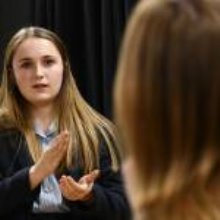
On Monday evening, three Upper Sixth Students delivered their Extended Project Qualification (EPQ) presentations to an audience of staff in the Drama Studio.
The Extended Project Qualification (EPQ) is an A Level standard standalone qualification designed to extend and develop students’ abilities beyond the A Level syllabus. The skills developed by taking an EPQ can enhance students’ performance in their other subjects and beyond into higher education and the workplace.
The qualification requires students to plan and carry out research on a topic that they’ve chosen and isn’t covered by their other qualifications. They then use this research to produce a written report and, in the case of practical projects, an artefact or a production.
An integral part of the assessment process for an EPQ is the delivery of a presentation about the project. Through their presentations students are required to detail what their topic is, why they chose it, what their aims and objectives are, research covered, what lessons they have learnt and finally, how this will impact them in the future.
Mairead M (Head Girl) started off the presentations with her chosen topic of ‘Capital Punishment in the US’. Throughout her allotted time, Mairead demonstrated her enthusiasm for the subject, giving an eloquent and well thought through depiction of her planning schedule, as well as noting the significance of learning how to academically write and correctly reference.
Following Mairead, Freya H, spoke about her topic of ‘Tiny Homes’, an environmental alternative to traditional houses, where individuals, notably the elderly, can live in compact homes which allow for freedom, have a greener impact on the landscape and benefit from a minimalist lifestyle. Freya also provided a 3D digital model of her idea, referencing her research in regulations, habits in the home and the benefits for those who are architecturally disadvantaged. The experience was one that Freya noted has changed her perception of the traditional home and how her research has led to her becoming open-minded about the prospect of living in a smaller space.
Finally, Ana J closed the presentations with her project about the relationship between music and identity and how our personalities can shape the way we listen. Throughout her presentation, Anya demonstrated excellent research skills about how adolescents formulate their musical tastes in terms of social screening and how different personality archetypes can correspond to different genres.
All of our students displayed a high level of confidence and enthusiasm for their chosen topics. Their skills in planning, researching and evaluation as well as all their hard work, really shone through.















